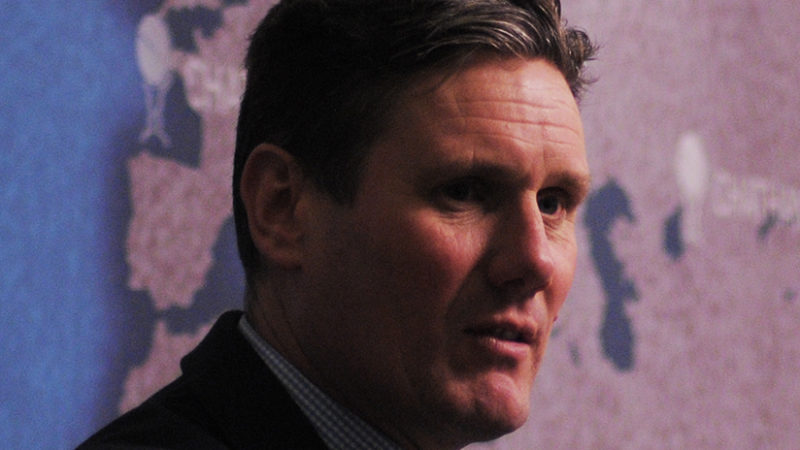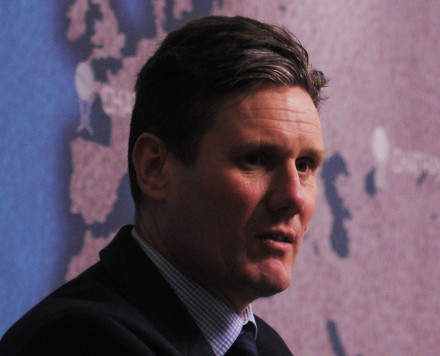

This is the full speech given by Keir Starmer, shadow Brexit Secretary, in response to a statement yesterday by his opposite number, David Davis, after Theresa May had outlined her vision for leaving the EU.
I thank the secretary of state for advance sight of his statement. The speech that the prime minister has just given is the most important she has ever given. It was about the future of our relationship with the EU and our position in the world. The place for such a speech is here, at the dispatch box. That is not just a convention; it is so that MPs across the House can question the prime minister on their constituents’ behalf about her plans for their future, and there are many questions.
For many months Labour has been demanding the fullest possible access to the single market, emphasising the risks of leaving the customs union, arguing for a collaborative relationship with our EU partners, and emphasising the need for transitional arrangements and to entrench workers’ rights. Today the prime minister has rightly accepted those in her plan, and I acknowledge that, but she has given little detail about how that is to be achieved, and there are some unanswered questions and big gaps. In truth, it is a half-in, half-out plan.
Let me give an example. The prime minister says that she does not want the jurisdiction of the European Court of Justice, but she wants a comprehensive trade agreement. Sooner or later, she and others will have to face up to the fact that any such agreement will have a disputes resolution clause, and that will have to be independent of this country; it will not be by reason and resolution in the High Court in London according to English law. She has avoided fronting up to some of these essential questions.
If the prime minister achieves all that she has set out to achieve, she will fall far short of the hard Brexit that many businesses and trade unions have feared—the Brexit of no deal, a bare trade agreement, out of any customs union and at arm’s length from our EU relations. It is good that she has ruled out that hard Brexit at this stage. However, as she knows, setting out ambitions is the easy bit; delivery is much more difficult. She is taking the precarious course of taking the UK out of single market membership and changing the customs arrangements. That will cause concern to businesses, as the secretary of state knows, and trade unions. The prime minister should have been more ambitious.
However, I accept that form follows function, so let me set out in terms what Labour will hold the prime minister to account for, as far as trade is concerned: tariff-free access to the single market; access to the single market unencumbered by impediment—that is what was in the exchange of letters with Nissan, and it is what all businesses want, and what all trade unions want for those dealing in goods and services; alignment of regulatory bodies to avoid dual bureaucracy or, worse, divergence; and a deal that works for goods and services. That is the test we set out today, the test we will return to throughout the negotiations, and the test to be applied when a deal is reached. That is why the concession on a vote at the end of the negotiations is significant. We have been demanding that for months, and it has not been given before today. It is significant because it means that we can ensure that those tests are met throughout the process and at the end.
The sting in the tail in this morning’s plan was the threat to destroy the economic model that has been in place for many decades if that ambition is not reached. That is a very serious threat. That model—a shared model on which there has been consensus for decades across this House—is designed to share prosperity, protect workers’ rights and improve living standards. There is no mandate for reckless disregard of that model and of so much of what this country stands for. The prime minister described that as resulting in self-harm for the EU. It would be an act of huge self-harm for the UK to abandon the economic model that we have had in place for so many years. It is also totally inconsistent with any meaningful commitment to workers’ rights and a fairer society. That threat—that sting in the tail—undermines the ambition in the plan that I recognise.
Let me touch on wider issues. The UK and the EU have hugely benefited from our collaborative work in the fields of criminal justice, anti-terrorism, research, medicine, science, technology, arts and culture, and much else. We should be seeking to preserve that collaboration, not destroy it, yet the prime minister said today:
“We do not seek to hold onto bits of membership as we leave.”
Let me give some examples of the bits that she should seek to retain—
[interruption from the Speaker]
the European Aviation Safety Agency, which deals with safety; the European Medicines Agency; and Europol, which I worked with for many years. Those are the bits of the EU that we should be seeking to retain, not throw away.
It was the previous prime minister who got us to this place without any forethought or planning. This prime minister has now chosen a risky implementation plan. She owns the consequences now, in 2019 and beyond.




More from LabourList
Government announce SEND reform in schools white paper
SPONSORED: ‘Industrial hemp and the challenge of turning Labour’s priorities into practice’
‘A day is a long time in politics, so we need ‘action this day’’